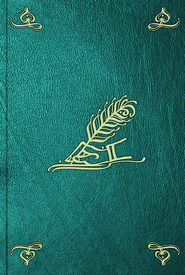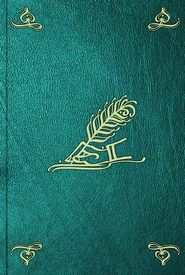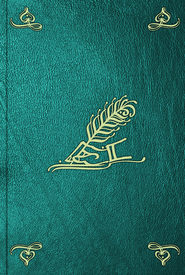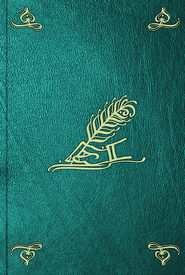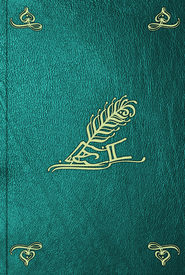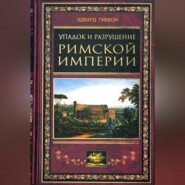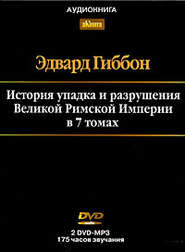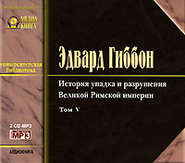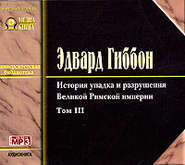По всем вопросам обращайтесь на: info@litportal.ru
(©) 2003-2025.
✖
Private Letters of Edward Gibbon (1753-1794) Volume 1 (of 2)
Настройки чтения
Размер шрифта
Высота строк
Поля
The Marquis de Mirabeau (1715-1789), father of the famous orator and political leader, belonged to the school of Economists. In 1760 his Théorie de l'Impôt had lodged him in the Bastille, and made him the fashion in Paris. Gibbon speaks of him in his Journal (February 24, 1763): "Il a assez d'imagination pour dix autres, et pas assez de sens rassis pour lui seul." He met him at a supper-party in the house of Madame Bontemps.
Footnote_50_50
Dr. Acton was a cousin of Gibbon. He married, "renounced his country, and settled at Besançon, and became the father of three sons, the eldest of whom, General (afterwards Sir John Francis Edward) Acton, is conspicuous in Europe as the principal minister of the King of the Two Sicilies." He was the grandfather of the present Lord Acton.
Footnote_51_51
Sir Willoughby Aston was returned M.P. for Nottingham in 1754, and was appointed Colonel of the Berkshire Militia in 1759. Lady Aston was a Miss Pye, of Farringdon, Berks. His "numerous" family consisted of his only son and successor, and of six daughters. He died August 24, 1772.
Footnote_52_52
William (afterwards Sir William) Guise, subsequently M.P. for Gloucestershire, only son of Sir John Guise, Bart., died without issue, April 6, 1783.
Footnote_53_53
M. de Mesery.
Footnote_54_54
In Gibbon's Journal at Lausanne, in June, 1757, occurs the entry: "I saw Mademoiselle Curchod —Omnia vincit amor, et nos cedamus amori." He was, in fact, shortly afterwards engaged to Suzanne Curchod, daughter and only child of the Minister of Crassy, a hamlet at the foot of the lower slopes of the Jura, between Geneva and Lausanne. Both the lovers were born in 1737, and were in their twenty-first year. At Lausanne, at the Société du Printemps and the Académie de la Poudrière, of which Suzanne Curchod was the founder and the president, she frequently met Gibbon, and the attachment, on her side at least, was strong and genuine; on his it seems to have always had a touch of affectation. The account given by Julie von Bondeli (E. Bodemann, Julie von Bondeli, pp. 217, 218: Hanover, 1874) of Gibbon's passion has the exaggeration of unreality. He was seen, says this friend of Wieland and Rousseau, stopping the country people near Lausanne, and demanding, at the point of a naked dagger, whether a more adorable creature existed than Suzanne Curchod. Gibbon wrote her several letters, some of which are quoted by M. d'Haussonville in his Salon de Madame Necker, and addressed to her indifferent verses. The following lines seem to be an expansion of the entry in his Journal: —
"Tôt ou tard il faut aimer,
C'est en vain qu'on façonne;
Tout fléchit sous l'amour
Il n'exempte personne,
Car Gib. a succombé en ce jour
Aux attraits d'une beauté
Qui parmi les douceurs d'un tranquil silence
Reposait sur un fauteuil," etc., etc.
They became engaged, and Gibbon implored her to marry him without waiting for the sanction of his father. This, however, she refused to do. When Gibbon left Lausanne in 1758, she wrote to him once; then all correspondence between them seems to have ceased, though Gibbon says that he wrote to her twice on his journey and once on his return to England. He also sent her his Essai with a dedicatory letter in 1761. In August, 1762, he wrote to break off the engagement, on the ground of his father's opposition, in a letter quoted by M. d'Haussonville (Le Salon de Madame Necker, pp. 57, 58). In 1763 Gibbon came to Lausanne, and there received from Mademoiselle Curchod a letter in reply, which showed, so far as words could prove anything, that she had never ceased to love him. Her friend, the Pastor Moultou, endeavoured to interest J. J. Rousseau in the story, and to make him speak to Gibbon on the subject. But Rousseau declined to interfere, saying that Gibbon was too cold-blooded a young man for his taste or for Mademoiselle Curchod's happiness. In Gibbon's unpublished diary, he thus comments on the receipt of this letter, September 22, 1763: "J'ai reçu une lettre des moins attendûes. C'etoit de Mademoiselle C. Fille dangereux et artificielle! Elle fait une apologie de sa conduite depuis le premier moment, qu'elle m'a connû, sa constance pour moi, son mepris pour M. de Montplaisir, et la fidelité delicate et soutenue qu'elle a cru voir dans la lettre où je lui annoncois qu'il n'y avoit plus d'espérance. Ses voyages à Lausanne, les adorateurs qu'elle y a eû, et la complaisance avec laquelle elle les a ecouté formoient l'article le plus difficile à justifier. Ni d'Eyverdun (dit elle), ni personne n'ont effacé pendant un instant mon image de son cœur. Elle s'amusoit à Lausanne sans y attacher. Je le veux. Mais ces amusements la convainquent toujours de la dissimulation la plus odieuse, et, si l'infidelité est quelquefois une foiblesse, la duplicité est toujours un vice. Cette affaire singulière dans toutes ses parties m'a été très utile; elle m'a ouvert les yeux sur le caractère des femmes, et elle me servira longtemps de preservatif contre les seductions de l'amour." Mademoiselle Curchod came to Lausanne in February, 1764, and again met Gibbon; "Elle me badine sur mon ton de petit maître. Elle a du voir cent fois que tout étoit fini sans retour." "Nous badinons," he says again in the same month, "trés librement sur nôtre tendresse passée, et je lui fais comprendre tout clairement que je suis an fait de son inconstance." Gibbon's continued coldness at length convinced Mademoiselle Curchod that his affection for her was entirely extinguished, and she took her leave of him in an indignant letter, quoted by M. d'Haussonville, as she undoubtedly thought, for ever. In this farewell letter she repudiates the suggestion of her inconstancy: "Si l'on vous a dit que j'aie écouté un seul moment M. d'Eyverdun, j'ai ses lettres, vous connoissez sa main, un coup d'œil suffit pour me justifier." Mademoiselle Curchod married, at the end of 1764, Jacques Necker, and became the mother of Madame de Stäel-Holstein.
Footnote_55_55
At Monrepos in 1757-58, when Voltaire was living at les Délices, Gibbon had heard him in his tragedies of Zaïre, Alzire, Zulime, and his sentimental comedy L'Enfant Prodigue. Voltaire settled at Ferney in 1758.
Footnote_56_56
Charles Paulet, fifth Duke of Bolton, who committed suicide in 1765, was succeeded in the Lord Lieutenancy of Hampshire by James Brydges, Marquess of Carnarvon. Lord Carnarvon resigned the post in 1764, because Mr. Stanley was appointed Governor of the Isle of Wight (Grenville Correspondence, vol. ii. pp. 399-403).
Footnote_57_57
Name illegible. Probably Lord Northington.
Footnote_58_58
Sir Thomas Worsley, Bart.
Footnote_59_59
On April 7, 1763, Lord Bute resigned, and was on the same day succeeded by George Grenville, as First Lord of the Treasury. During the autumn recess, George III. opened negotiations with Pitt to take Grenville's place. But no change was made, and Grenville was preparing to meet Parliament in November, 1763, as Prime Minister.
Footnote_60_60
Henry Temple, second Viscount Palmerston (1739-1802), a man of artistic tastes, and, in after-years, a frequent resident in Italy. He was at this time M.P. for Hastings. He married, as his second wife, January 3, 1783, Miss Mee, by whom he was the father of the Prime Minister, born 1784.
Footnote_61_61
In Gibbon's Journal for September 23, 1762, written at Southampton, occurs the following entry which explains the words "my friend Wilkes: " – "Colonel Wilkes of the Buckinghamshire Militia dined with us, and renewed the acquaintance Sir Thomas and myself had begun with him at Reading. I scarce ever met with a better companion; he has inexhaustible spirits, infinite wit and humour, and a great deal of knowledge: but a thorough profligate as well in principle as in practice; his character is infamous, his life stained with every vice, and his conversation full of blasphemy and bawdy. These morals he glories in, for shame is a weakness he has long since surmounted. He told us himself that, in this time of public dissension, he was resolved to make his fortune. Upon this noble principle he has connected himself with Lord Temple and Mr. Pitt, commenced a public adversary to Lord Bute whom he abuses weekly in the North Briton, and other political papers in which he is concerned. This proved a very debauched day; we drank a good deal both after dinner and supper, and when at last Wilkes was retired, Sir Thomas and some others (of whom I was not one) broke into his room and made him drink a bottle of claret in bed." Wilkes had been challenged by Mr. Samuel Martin, M.P. for Camelford, formerly Secretary of the Treasury under both the Duke of Newcastle and Lord Bute, for speaking of him in the North Briton as a low fellow and dirty tool of power. Wilkes was dangerously wounded in the duel, which was fought in November, 1763. In the preceding April he had been arrested under a General Warrant on suspicion of being the author of No. 45 of the North Briton. He applied for a writ of Habeas Corpus, and the case came before Lord Chief Justice Pratt in the Court of Common Pleas. He was discharged from custody, the judges unanimously holding that the arrest was a breach of his privilege as a member of Parliament.
Footnote_62_62
Gibbon refers to his promotion to the rank of major in the Hampshire Militia.
Footnote_63_63
Lady Mary died in 1761. A surreptitious edition, said to be edited by John Cleland, of her letters written during her travels in Europe, Asia, and Africa, was published in three volumes at London in 1763.
Footnote_64_64
George Pitt, first Lord Rivers (cr. 1776), served as Envoy at the Court of Turin from 1761 to 1768, in which latter year he was elected M.P. for Dorsetshire. He died in 1803, at the age of eighty-two.
Footnote_65_65
Edward Augustus, Duke of York, third child and second son of Frederick, Prince of Wales, born March 14, 1739, died September 17, 1767, at Monaco.
Footnote_66_66
Louis Dutens (1730-1812), chaplain to the Embassy at Turin in 1758, had, in the absence of the Envoy (the Hon. Stuart Mackenzie), acted as chargé d'affaires. He retained the post till the appointment of George Pitt in 1762. In 1764 he was once more acting as chargé. The Count de Viry had been Sardinian Minister in London, where his services to Lord Bute gained him from George III. a pension of £1000 a year, and a promise of the post of minister for his son. Viry was at this time Foreign Secretary to Charles Emanuel III.
Footnote_67_67
Sir M. Featherstonhaugh, Bart., F.R.S., M.P. for Portsmouth, died March, 1774.
Footnote_68_68
At Lausanne, in 1764, Gibbon met Mr. Holroyd (afterwards Lord Sheffield). In his Journal for April 6, 1764, he says: "J'ai conçu une véritable amitié pour Holroyd. Il a beaucoup de raison et des sentimens d'honneur avec un cœur des mieux placé." The friendship then begun ripened into warm affection. "My obligations to the long and active friendship of Lord Sheffield," Gibbon says in the will by which he appoints his friend one of his executors, "I could never sufficiently repay." Of the warmth of his affection, and the nature of some of his obligations, the letters now published afford continual proof.
Footnote_69_69
Charles Emanuel III., Duke of Savoy and second King of Sardinia, came to the throne on the abdication of his father in 1730. He died in 1773. "He is the most insignificant looking fellow I ever saw; but he has so much good-nature, and such obliging manners, that one is soon reconciled to his appearance" (Scrope to George Selwyn, January 12, 1752).
Footnote_70_70
This was a characteristic habit of Gibbon's throughout life. In 1780 some verses were written by Richard Tickell, which purport to be addressed by Charles James Fox to his friend the Hon. John Townshend on his election to Parliament by the University of Cambridge. They contain the following lines: —
"Soon as to Brookes's thence thy footsteps bend,







